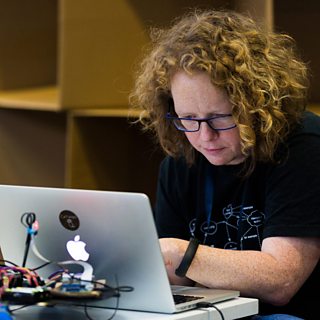The R&D Futures project develops our ability to pick up on trends in audience habits and their media and technology landscapes. We try to extrapolate how these trends might play out over the next few years and how R&D and the �鶹Լ�� might respond.
One of the ways we do this is by gathering links to things that we think look like signals of changes in the world and periodically bundling them together for analysis. This is our bundle for June 2021!
The project is run by Libby and Henry and a rotating crew of colleagues from across R&D and the wider �鶹Լ��. If you're interested in collaborating with us, get in touch!

Streaming theatre
Theatres are using technology to tell their stories in new ways and making their productions accessible to more people. As we explore this signal the connection between a theatre’s aims and R&D technologies becomes obvious. Everything from shuffling characters and events to generate narrative possibilities in real time, to creating a sense of togetherness and being part of a crowd when productions are streamed. R&D also have a part to play in helping smaller theatres who might feel unable to compete against big budgets, to bring these offerings in more affordable and streamlined ways.
Ambient togetherness
One of the things missing from a streaming theatre show is the feeling of being present with an audience, all experiencing the same thing together. We’ve noticed many things bubbling up during the coronavirus pandemic which seem to be scratching that itch.
Fading relevance of physical locations?
Does a widespread adoption of streaming technologies by live entertainment producers make their physical locations less relevant? As noted above, there are some aspects of being present at a live show that are very hard to replicate online, but does that even matter? The obvious answer to this is ‘yes’, but it’s interesting to consider that being physically present in a theatre could be come to thought of as the ‘premium’ version of seeing a show, creating a duality of online v.s. physical experience of a show, with each mode playing to its experiential strengths. UKRI have been doing some interesting R&D around this with their
Ethics at work
’s recent difficulties have highlighted that increasingly, those with high paid technology jobs are joining companies which align with their own values and ethos or quitting ones which are not; or failing that, attempting to change them from within. There have been of the difficulties within Google around discussion of ethics within the company, culminating in the creation of a worker’s council:
"In the last two years, the search giant has endured a series of internal protests as employees have complained about a in China and accused of sexual harassment."
Now similar concerns have , a much rarer occurrence. Others are embracing freelance life or creating their own companies so they can align their work lives with their values. This is very much about privileged people who can walk awy form their jobs into well-paid alternatives.
Disruptions to the online ad business
Google announced that they will be removing support for 3rd party cookies by 2022. This caused a massive uproar in the ad industry with a 60-90% loss in projected revenue (no mention of what this could mean for Google themselves).
Google is working on a number of initiatives called the Privacy Sandbox which are looking to improve end user security.
FLoC, or “Federated Learning of Cohorts” is part of a set of new technologies that Google are introducing in Chrome as part of its Privacy Sandbox project. One of the goals of Privacy Sandbox is to remove 3rd party cookies from the web, one of the main user tracking vectors, while introducing new technologies to satisfy use cases that currently rely on 3rd party cookies. The primary use case for 3rd party cookies is advertising. The choice of which ads to show on a web page may typically be based on three broad categories of information:
- First-party and contextual information - e.g., "put this ad on pages about motor sport" (not reliant on 3rd party cookies)
- General information about the interests of the person who is going to see the ad - e.g., “show this ad to people who like classical music”
- Specific previous actions the person has taken, also known as “retargeting” - e.g., someone looks at a product on (for example) amazon.co.uk, and they leave without purchasing. They later visit the �鶹Լ�� website, where they see an ad for the product they saw on Amazon
FLoC aims to address only category 2, ad targeting based on someone's general interests. (Other Privacy SandBox proposals such as FLEDGE aim to support category 3.)
There is currently a lot of interest in FLoC in the media (for example: EFF, Gizmodo) and the �鶹Լ�� needs to establish its position for either blocking or contributing to Google's experiment.
Continuing trends
A number of the signals we collected in June were evidence of the continuation of trends we identified last month.
- The sound and fury around NFT art shows no sign of abating just yet, with and announcing auctions of NFT works.
- The world of cryptocurrency in general continues to show frenzied activity, with currency miners in the US to power their operations, the value of some of the biggest currencies and .
- , a particularly visible sign being car factories unable to complete manufacture of some models, as well as smaller electronics producers having to switch to older components or even halting production.
On our radar
Changes we’re just getting the inklings of, things we’re keeping an eye on.
- Changes to global supply and demand: it’s not just silicon, . What will the knock-on effects of this?
- With shifting patterns of restrictions between countries, mutating covid variants and sensible cautiousness, travel is going to be weird for a while longer. What will this mean for the travel industry, holidays, business travel, conferences, geographically-dispersed families?
- As lockdown is eased in the UK, many employees will be going back to the office for the first time in over a year. We’ve heard a lot about ‘hybrid working’, where offices become ‘hubs’ for meeting and collaboration and a lot of work continues to be done at home. What does the working world look like in six months, one year, five years time? What does this do to company culture, businesses dependent on commuters and office workers, mental health?

